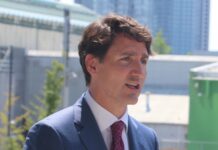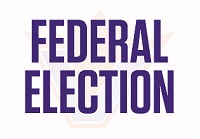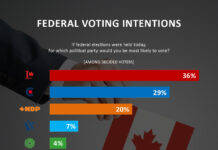WE remain in a deadlocked national race, with the Conservatives enjoying a one-point, statistically insignificant lead., according to EKOS Poll on Friday.

Results suggest that there may have been some effects from the debates. The most important finding is the diminution of the Liberal Party’s Ontario lead. The 13-point advantage the Liberals enjoyed in Ontario has sharply eroded since the debate (though there appears to have been a modest recovery in the later part of the polling period).
Conservative Leader Andrew Scheer appears to have strengthened this party’s support with working class and non-university educated voters. The Conservatives own the working class segment (39 per cent, compared to 22 per cent for the Liberals) and their strength is dramatically higher among college educated and high school educated. Indeed, social class and education are now the principal fault lines dividing Liberals and Conservatives.
Despite Jagmeet Singh’s performance, the NDP has not seen much progress. Their vote has stiffened and the party has opened up an advantage with second choice but, so far, this has not elevated them above their current position of 13 points. The NDP also seems to be doing better with visible minorities (which may be a result of Singh’s performance in the debates).
So far, the debates have had no clear impact on the Green Party’s fortunes, but they continue to do well in British Columbia, where they are now second. The Bloc Québécois appears to have benefited from the TVA debate and they are now at 25 per cent in Quebec.
There is no clear evidence that the People’s Party was helped by the debates. However, the party has a surprising overrepresentation with millennial and university-educated voters. Indeed, the party is doing twice as well with those under 50 as it does with those over 50.
Regionally, the Liberals continue to do well in Atlantic Canada and Quebec. British Columbia remains a highly unpredictable four-way contest. The Prairies are clearly voting Conservative, but the Conservative Party seems to have faltered in Quebec.
There is still evidence of considerable fluidity, particularly among non-Conservatives. Green Party supporters are the most likely to say they may change their minds, with the NDP and Liberals being the potential beneficiaries, in that order. Similarly, NDP supporters still have potential to change their minds, and the primary beneficiaries would be the Liberals and Greens.
The Conservatives, meanwhile, have the firmest vote and its supporters are among the least likely to change their minds (though its supporters express some receptivity to the Liberals and People’s Party). However, the party lags well behind all other parties in terms of second choice and has the least room to grow.
Bottom line:
What was already a tight race has become tighter and more unpredictable. Conservatives have a more committed constituency, but little room to grow. Despite strong reviews, the NDP has yet to make any significant movement upwards with no apparent breakthrough looming.
Our current numbers would suggest a Liberal minority, but the election is still highly uncertain. Ontario will be the critical factor shaping the final outcome. Canadians may well be staying up late seeing how the four-way races in British Columbia play out before we’ll be able to determine who will form government.













